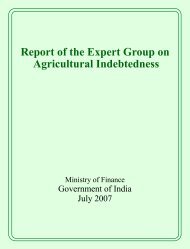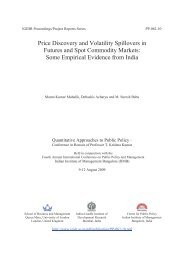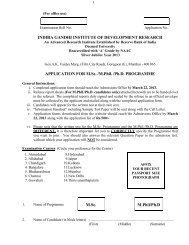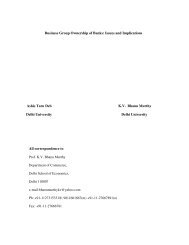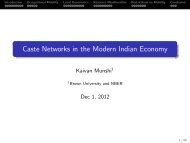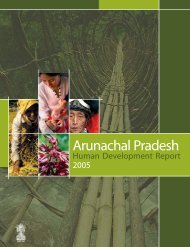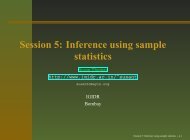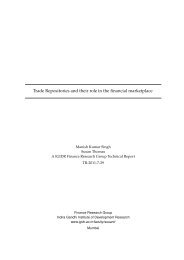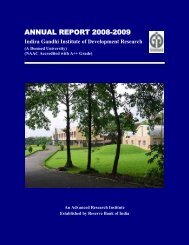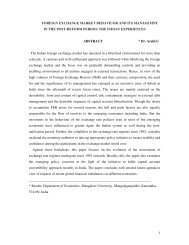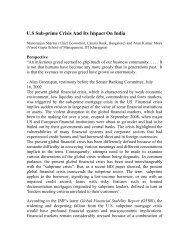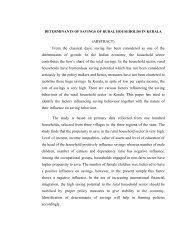National Human Development Report: 2001 - Indira Gandhi Institute ...
National Human Development Report: 2001 - Indira Gandhi Institute ...
National Human Development Report: 2001 - Indira Gandhi Institute ...
- No tags were found...
Create successful ePaper yourself
Turn your PDF publications into a flip-book with our unique Google optimized e-Paper software.
NATIONAL HUMAN DEVELOPMENT REPORT <strong>2001</strong> SOME OTHER ASPECTS OF WELL-BEING 111estimated that indoor pollution in India’s rural areas is responsible for fivehundred thousand premature deaths annually, mostly of women and childrenunder 5. This accounts for 6-9 per cent of the national total measured interms of Disease Adjusted Life Years. These estimates make the healthimpact of indoor exposure larger than the burden from all but two of theother major preventable risk factors that have been quantified, malnutrition(15 per cent) and lack of clean water and sanitation (7 per cent).Much of the air pollution is a result of faulty planning of civic amenities,inappropriate technology and above all indifferent enforcement of pollutioncontrol norms. An integrated approach involving each of these elements hasbecome an imperative for public policy and administration in most of theurban and rural areas in the country. An additional requirement, especiallyfor the rural areas is the urgent need to make it possible for the people tomove up the energy ladder with a view to address the adverse health impactof indoor pollution on account of the use of unprocessed cooking fuels.Urban Solid Waste and Noise PollutionThe levels of urban solid wastes being generated in different cities posesa serious threat to environmental quality and human health. Many citiesgenerate more solid wastes than they can collect or dispose of. Even whenthere are adequate resources available by way of public provisions to themunicipal authorities, the safe disposal of solid waste often remains aproblem. Open dumping and uncontrolled land filling are in most cases themain disposal methods. The organic material (garbage) is a fertile breedingground for bacteria and viruses that cause disease. Due to inadequatecollection, improper disposal and lack of proper storage facilities, solid wasteget into open drains and obstruct free flow of water. This in turn becomes anideal breeding ground for diseases. The municipal solid waste sites oftenreceive industrial and hazardous waste including those from hospitals andlaboratories adding to the problem of disposal and serious consequences forenvironment and health of individuals. The system for disposing nonbiodegradableurban solid waste is practically non-existent. There istremendous scope for improving technological input and institutionalisationof responsible social practices such as, the practice/requirement ofsegregating household solid waste into distinct categories for facilitating anefficient and environmentally safe disposal.A major problem in urban solid waste management relates to sewagedisposal. With inadequate and often inappropriate and malfunctioningsystems of sewage disposal, the threat to the availability of safe drinkingwater is quite serious in most urban areas in the country. There is an urgentneed for revamping and maintaining the sewage system in almost all citiesand more importantly increasing its coverage to slums and the shanties thatare entrenched in most metro cities.Noise pollution is perhaps, the most under rated and under emphasisedaspect of urban environmental hazard to human well-being. The noisepollution refers to presence of sound in the environment at levels that areinjurious to human health, especially, when exposed on a sustained basis.Persons regularly exposed to loud sounds are likely to suffer more fromhearing impairment, sleep disturbance and general stress than those who livein more salubrious environment. The vehicular traffic is the most widespread source of noise pollution. In most Indian cities, the average noise level



